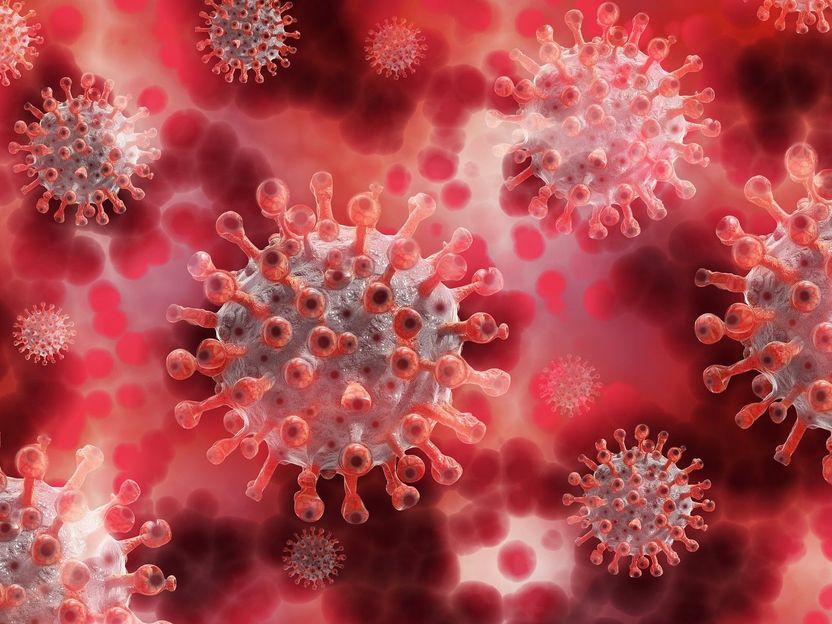The human helpers of SARS-CoV-2
Drug targets were identified
Advertisement
Like all viruses, the novel coronavirus is dependent on help from the human host cell. proteins are the functional units of the cell and enable the virus to enter the host cell or help the virus to replicate. Scientists from the Berlin Institute of Health (BIH), Charité – Universitätsmedizin Berlin and the University of Cambridge, along with colleagues from the United Kingdom, Germany and the United States, have examined the corresponding genes of the helper proteins in a large study. They discovered numerous variants that influence the amount or function of the proteins as well as their ability to support the virus. The gene variants reveal potential target structures for new drugs.

Symbolic image
geralt, pixabay.com
An infection of the novel coronavirus SARS-CoV-2, just like any other viral infection, follows a specific pattern: The viruses first bind to receptor proteins on the surface of the human host cells in the throat, nose or lungs before entering the cell, where they replicate with the help of the host cell machinery. The newly formed virus particles cause the infected cell to burst and infect other cells. As soon as the immune system notices what is happening, a defense mechanism is activated with the goal of destroying and removing both the viruses and virus-infected cells. Under normal circumstances, the infection is over within two weeks at the most. For all these processes, however, the virus is dependent on human (or host) proteins.
Gene variations influence the course of COVID-19
“In severe courses of COVID-19, this regulated process gets out of control and the immune system causes an excessive inflammatory response that attacks not only virus-infected cells but also healthy tissue,” says Claudia Langenberg, BIH Professor of Computational Medicine and senior author of the current study. “Naturally occurring variations in the genes that make up the blueprint for these human proteins can alter their concentration or function and may thus be responsible for the different course of the disease.”
The team is well versed in identifying genetic variants that affect the concentration or fuction of proteins and other molecule in human blood. “As molecular epidemiologists, we study the diversity of genes – that is, the building instructions for proteins – of large population groups in order to uncover susceptibilities to diseases which are caused by the interaction of many small deviations,” explains the epidemiologist, who joined the Berlin Institute of Health from the Medical Research Council Epidemiology Unit at the University of Cambridge in September. “Our aim was to use our data and expertise to make them available to the scientific community for rapid use in the COVID-19 epidemic and crisis.”
Drug targets were identified
“We examined 179 proteins known to be involved in SARS-CoV-2 infection for their naturally occurring variants,” reports Dr. Maik Pietzner, the study’s lead author and a scientist in Langerberg’s lab. “We were able to draw on findings which were based on the first COVID-19 patients at Charité as we collaborate closely with the research group led by Professor Markus Ralser, Director of the Institute of Biochemistry at Charité, which had previously reported these findings.”
The international team used data from the MRC Fenland cohort, a large population study that collected detailed information from more than 10,000 healthy individuals. They discovered 38 targets for existing drugs as well as evidence that certain proteins that interact with the virus influence the immune system. “Our findings also help to better understand risk factors for severe courses of COVID-19. We were able to show that blood coagulation proteins are influenced by the same genetic variant that increases the risk of contracting COVID-19 and that determines blood group 0,” reports Maik Pietzner.
The team made the results immediately publicly available via an interactive webserver, which was developed with colleagues from the Helmholtz Centre Munich. Scientists from around the world have since been using the data to identify new drug targets or to better understand the course of COVID-19. “Journal articles that used our findings appeared even before our work was officially published,” comments Claudia Langenberg, “this is exactly what we had hoped for.”
Original publication
Other news from the department science
Most read news
More news from our other portals
Something is happening in the life science industry ...
This is what true pioneering spirit looks like: Plenty of innovative start-ups are bringing fresh ideas, lifeblood and entrepreneurial spirit to change tomorrow's world for the better. Immerse yourself in the world of these young companies and take the opportunity to get in touch with the founders.























































